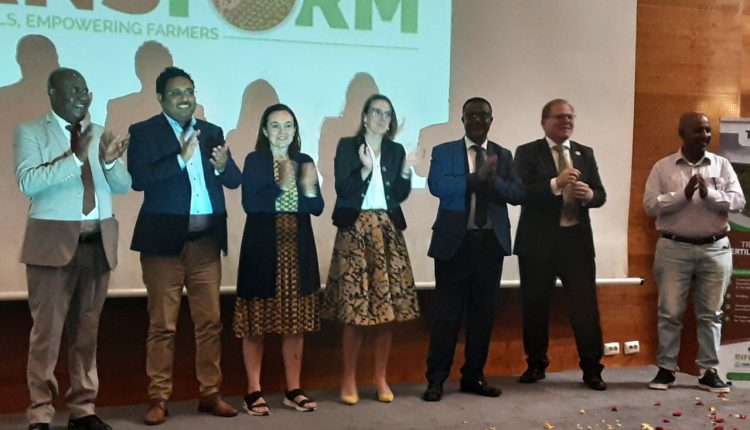A four-year project to boost soil health, agricultural productivity in Ethiopia launched
Addis Ababa, April 3, 2025 (FMC) — A project dubbed Transform Soil Fertility Management in Ethiopia (TRANSFORM) was launched in Addis Ababa today to enhance agricultural productivity and improve food security.
The project, which will run from 2025 to 2028, aims to rehabilitate 65,000 hectares of farmland and empower 100,000 smallholder farmers across the country.
Funded by the Embassy of the Kingdom of the Netherlands and the European Union, TRANSFORM focuses on enhancing soil health and fertility, improving food security, and addressing the urgent issue of land degradation.
The launch ceremony, held in Addis Ababa, brought together key stakeholders from federal and regional government, development partners, and international organizations.
On the occasion, it was indicated that TRANSFORM seeks to sustainably increase the productivity of 100,000 small-scale food producers and enhance the sustainable use of 65,000 hectares of farmland in Amhara, Oromia, and the Central Ethiopia regional states.

Mr. Eyasu Elias, State Minister at the Ministry of Agriculture, opened the event, emphasizing the critical role agriculture plays in Ethiopia’s economy. “Agriculture is the backbone of our national economy, influencing food security, employment, and economic development,” he said.
He went on to highlight the urgent challenges posed by soil degradation, such as nutrient depletion, erosion, and the exacerbating effects of climate change, and called for a collaborative approach to address these issues.
Mr. Eyasu underscored the Ethiopian government’s commitment to improving soil health, noting that soil fertility and restoration are central to the country’s agricultural policies.
He highlighted the government’s existing initiatives, including the Green Legacy Initiative and extensive soil amendment programs. “Together, we can implement the Transform program, tackle the challenges outlined today, and seize the opportunity before us,” he added, emphasizing the importance of collaboration for long-term success.

Ms. Paula Schindeler, Deputy Ambassador and Head of Development Cooperation at the Embassy of the Netherlands, also addressed the audience, noting the strong historical partnership between the Netherlands and Ethiopia. “Next year, our two countries will celebrate 100 years of trade relations, which underscores the Netherlands’ long-term commitment to Ethiopia,” she said.
According to her, the Netherlands has been backing Ethiopia’s development efforts across various sectors, including agriculture, water, and health.
“Soil health is the foundation of sustainable agriculture,” she emphasized, stressing that the project’s goal to mobilize smallholder farmers, especially women and youth, will be critical in addressing the impacts of climate change and building resilience against extreme weather events.
The Deputy Ambassador further noted that the TRANSFORM project aligns closely with Ethiopian policy priorities, including the Soil Health and Fertility Improvement Strategy and the Climate Resilient Green Economy.
Ms. Schindeler also praised the project’s inclusive approach, which will empower local communities to take ownership of land management and conservation.

Henk van Duijn, President and CEO of (International Fertilizer Development Center (IFDC), framed the TRANSFORM project within the broader African context, underscoring Ethiopia’s leadership in the African Union’s soil restoration efforts.
He emphasized the need for holistic approaches, including regenerative agriculture practices and nutrient recycling, to reduce the country’s reliance on imported fertilizers and promote sustainable farming.

For his part, Mr. Tolessa Debelem, Program Director at IFDC, highlighted the project’s focus on empowering smallholder farmers and ensuring that interventions are tailored to local needs.
He noted that the project would provide farmers with the knowledge and tools to improve soil fertility, while also fostering community-driven solutions.
“Farmer-led actions are key to the success of this project,” he said. “The project aims to not only improve soil quality but also increase farmers’ capacities to manage their land sustainably.”
The project will use the Integrated Farm Planning (PIP) approach, a structured approach where farm households and communities learn to envision their desired future and create a strategic plan to achieve it. Key principles of this approach include: empowerment, integration, and collaboration.
TRANSFORM is implemented in collaboration with Wageningen University & Research/Wageningen Environmental Research, ISRIC – World Soil Information, Environment and Coffee Forest Forum (ECFF), and SOS Sahel Ethiopia.

